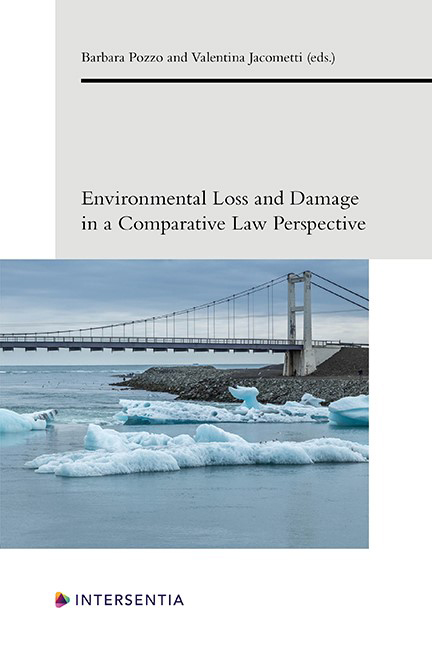Book contents
- Frontmatter
- Preface
- Contents
- List of Authors
- PART I LIABILITY FOR ENVIRONMENTAL HARM IN THE EU
- PART II PRIVATE AND CORPORATE ENVIRONMENTAL LIABILITY
- PART III THE ROLE OF CRIMINAL LIABILITY
- PART IV LEGAL TRANSPLANTS IN THE ENVIRONMENTAL FIELD: THE CASE OF ENVIRONMENTAL LIABILITY
- PART V STATE AND INTERNATIONAL ENVIRONMENTAL LIABILITY
- PART VI CLIMATE CHANGE LIABILITY
- PART VII LIABILITY, CLIMATE CHANGE AND NATURAL HAZARDS: THE ROLE OF INSURANCE
- PART VIII REAL COMPENSATION AND OFFSET REGIMES: THE STRATEGY OF “NO NET LOSS”
- About the Editors
The Jurisprudential Configuration of the “Polluter Pays” Principle: A Critical Assessment
Published online by Cambridge University Press: 26 May 2021
- Frontmatter
- Preface
- Contents
- List of Authors
- PART I LIABILITY FOR ENVIRONMENTAL HARM IN THE EU
- PART II PRIVATE AND CORPORATE ENVIRONMENTAL LIABILITY
- PART III THE ROLE OF CRIMINAL LIABILITY
- PART IV LEGAL TRANSPLANTS IN THE ENVIRONMENTAL FIELD: THE CASE OF ENVIRONMENTAL LIABILITY
- PART V STATE AND INTERNATIONAL ENVIRONMENTAL LIABILITY
- PART VI CLIMATE CHANGE LIABILITY
- PART VII LIABILITY, CLIMATE CHANGE AND NATURAL HAZARDS: THE ROLE OF INSURANCE
- PART VIII REAL COMPENSATION AND OFFSET REGIMES: THE STRATEGY OF “NO NET LOSS”
- About the Editors
Summary
INTRODUCTION
Almost 15 years after the enactment of the Environmental Liability Directive (ELD), quite a few lacunae in the established Union liability regime have been highlighted. One can observe significant discrepancies among national environmental liability frameworks that implement the ELD, which to a large extent can be attributed to a certain confusion about how the ELD applies, as well as about the meaning of the concepts and the scope of the exceptions.
Within this context, an important issue that remains unsettled is the potential extension of liability beyond the operators of the activity that brought about the pollution and the environmental damage. More specifically, the Court of Justice of the European Union (CJEU) has recently dealt with the question whether national legislation that holds the owners of contaminated sites liable for the pollution that occupational operators caused while using their land can be in accordance with the ELD.
This problem has its roots in the fact that the ELD is explicitly based on the “polluter pays” principle (PPP). In this regard, it is controversial to decide whether, and for the sake of a more stringent system of environmental protection, Member States are allowed to extend liability beyond the apparent polluters so as to cover more actors. Of course, as might be expected, the problem is exacerbated if the actual polluters are untraceable or insolvent.
Accordingly, this chapter examines whether national environmental liability regimes that extend liability are in conformity with the PPP, as enshrined in the ELD.
In dealing with this topic, this chapter adopts a jurisprudence-based approach. The case law of the CJEU is examined so as to elucidate the notion of the PPP in the field of environmental liability. The emphasis is placed on a triad of relatively recent CJEU cases that deal with the PPP and the extension of environmental liability. This triad consists of the landmark case ERG, the Fipa case, and the most recent case, TTK. Particular attention is called to the judgment in TTK, which raises significant issues, but is still not as thoroughly scrutinised by scientific legal literature.
In terms of structure, section 2 presents the PPP as an economics principle that is translated into EU law. Section 3 presents the core content of the PPP, as clarified by landmark CJEU cases.
- Type
- Chapter
- Information
- Publisher: IntersentiaPrint publication year: 2021



